- Afrikaans
- Albanian
- Amharic
- Arabic
- Armenian
- Azerbaijani
- Basque
- Belarusian
- Bengali
- Bosnian
- Bulgarian
- Catalan
- Cebuano
- chinese_simplified
- chinese_traditional
- Corsican
- Croatian
- Czech
- Danish
- Dutch
- English
- Esperanto
- Estonian
- Finnish
- French
- Frisian
- Galician
- Georgian
- German
- Greek
- Gujarati
- haitian_creole
- hausa
- hawaiian
- Hebrew
- Hindi
- Miao
- Hungarian
- Icelandic
- igbo
- Indonesian
- irish
- Italian
- Japanese
- Javanese
- Kannada
- kazakh
- Khmer
- Rwandese
- Korean
- Kurdish
- Kyrgyz
- Lao
- Latin
- Latvian
- Lithuanian
- Luxembourgish
- Macedonian
- Malgashi
- Malay
- Malayalam
- Maltese
- Maori
- Marathi
- Mongolian
- Myanmar
- Nepali
- Norwegian
- Norwegian
- Occitan
- Pashto
- Persian
- Polish
- Portuguese
- Punjabi
- Romanian
- Russian
- Samoan
- scottish-gaelic
- Serbian
- Sesotho
- Shona
- Sindhi
- Sinhala
- Slovak
- Slovenian
- Somali
- Spanish
- Sundanese
- Swahili
- Swedish
- Tagalog
- Tajik
- Tamil
- Tatar
- Telugu
- Thai
- Turkish
- Turkmen
- Ukrainian
- Urdu
- Uighur
- Uzbek
- Vietnamese
- Welsh
- Bantu
- Yiddish
- Yoruba
- Zulu
Custom Screws Tailored for Your Unique Project Needs and Specifications
Understanding Custom Screws An Essential Component in Modern Manufacturing
Screws are among the most ubiquitous fasteners in the world, playing a crucial role in countless applications, from household items to industrial machinery. While standard screws fulfill many general purposes, there are instances where a custom screw is essential to meet specific design or functional requirements. Custom screws are tailored to the exact needs of a project or application, ensuring that they provide the necessary strength, precision, and compatibility.
The Importance of Custom Screws
In manufacturing and construction, the phrase one size fits all often falls short. Various industries have unique specifications that standard screws cannot always meet. Custom screws are designed to accommodate these specific needs, considering factors such as size, shape, material, and thread design. This level of customization ensures that the screws will perform optimally in their intended environment, enhancing the overall efficiency and safety of the final product.
Design and Engineering Considerations
The process of creating custom screws begins with comprehensive design and engineering considerations
. Engineers collaborate closely with clients to understand the application's requirements, including load-bearing capacity, environmental conditions, and aesthetic preferences. For instance, screws used in automotive applications might need to withstand high levels of vibration and exposure to extreme temperatures, which necessitates the use of specialized materials, such as stainless steel or titanium.The design phase often involves creating detailed specifications, including dimensions, thread type (coarse, fine, or specialized threads), and head styles (such as pan, flat, or hex). Advanced computer-aided design (CAD) tools are frequently employed to simulate the performance of the screw within the context of its assembly, allowing for precise adjustments before production begins.
Material Selection
The choice of material is a critical aspect of custom screw manufacturing. Depending on the intended application, different materials offer various advantages
1. Stainless Steel Known for its corrosion resistance and strength, stainless steel is a popular choice for many applications, particularly in environments exposed to moisture or chemicals. 2. Carbon Steel Offering high strength and durability, carbon steel screws are commonly used in structural applications.
custom screw

3. Titanium Ideal for lightweight and high-strength requirements, titanium screws are often found in aerospace and medical applications.
4. Plastic In situations where electrical conductivity is a concern, or weight must be minimized, plastic screws can provide an effective solution.
Manufacturing Process
Once the design and material have been finalized, the manufacturing process begins. Custom screws can be produced using various techniques, including
- Turning In this method, a lathe machine shapes the screw by rotating it against cutting tools. It is suitable for creating precise dimensions.
- Cold Forming This process involves shaping the screw without heating the material, which helps retain its strength and reduces waste.
- Thread Rolling This technique involves deforming the screw's surface to form threads, ensuring a strong and precise finish.
Quality control is essential throughout the manufacturing process. Rigorous testing is conducted to ensure that each screw meets the required specifications, including tensile strength, hardness, and corrosion resistance.
Conclusion
Custom screws play a vital role in various industries by ensuring that assemblies are not only secure but also aligned with specific operational demands. From automotive to aerospace and construction, the demand for customized fasteners will continue to grow as technology evolves and new applications emerge. By investing in custom screws, manufacturers enhance product efficiency, reliability, and ultimately, customer satisfaction. As industries move toward greater precision and performance, the importance of custom screws in modern manufacturing cannot be overstated.













